Search engines are the gateways to the wild and wonderful world of websites.
Between mega-giants that have turned their brand name into a verb, to the little guys specialized in uncommon languages, search engines come in all sizes and functions.
If you’re here, you’re probably curious about what other options there are, or maybe you’re looking to make a new engine your go-to guy.
In this comprehensive article, we will take a look at:
What is a search engine?
A search engine is a software system that is designed to search for websites on the internet and provide them with relevant answers based on the user’s search query.
How do search engines work?
There are three processes a search engine does to give you results that best match your query:
- Crawling
- Indexing
- Ranking and serving
1. Crawling
Crawling is a process during which the search engine tries to discover new web pages (and their content) on the internet via hyperlinks.
Here’s a simplified breakdown of how it works:
- Seed URLs: The process starts with a list of initial URLs (seeds) to visit.
- Fetch pages: The crawler analyzes and fetches the content from these URLs.
- Extract links: It identifies all hyperlinks on these pages.
- Dofollow links: The crawler adds new links to its list of URLs to visit.
- Index content: It stores and indexes the fetched content for search engines to analyze and retrieve.
This process continues iteratively, allowing search engines to build comprehensive indexes of web content.
2. Indexing
Indexing is a process of validating and storing the content from the webpages in the search engine’s database, called the “Index”.
The index works as a vast library, containing nearly every webpage in existence.
Generally speaking, your website has to be indexed first in order to be displayed on the search engine results page (SERP).
Keep in mind that both crawling and indexing are continuous processes that take place over and over again to keep the database fresh and relevant.
Once the webpage is analyzed and saved in the index, it can be pulled up as a search result for a potential search query.
Tip: To find all your indexed pages, you can use Google Search Console or you can do a quick check by using the site search operator: “site:domain.com”
3. Ranking
The last step involves picking the best results and creating a list of pages that will appear on the search engine result page (SERP).
This is like a librarian combing through books and choosing the best ones with the most accurate and relevant information, with no damage or missing pages.
Every search engine uses dozens of SEO ranking factors, many of which are kept secret from the public to avoid manipulation and to keep proprietary integrity.
As Martin Splitt, Webmaster Trends Analyst, stated:
“We have over 200 signals to do so. So we look at things like the title, the meta description, the actual content that you’ve got on your page, images, links, all sorts of things.”
With the basics down, it’s time to go deeper into how ranking and search algorithms work, because it’s a lot more complicated than browsing through a library.
What is a search engine algorithm?
The term “search engine algorithm” refers to a complex system of multiple algorithms that analyze all indexed pages and determine which ones should appear in the search results for a specific query.
For example, the Google algorithm uses dozens of factors (many of them are well-known, while some of them are kept a secret) in several areas such as:
- Meaning of the query: First is understanding what the user means by using the exact words they used, what the search intent is, and more.
- Page relevance: The algorithm determines how closely this page answers what was searched. For example, if you look for “dog grooming near me”, you don’t need a page about hypoallergenic dogs.
- Content quality: Then is the quality of the information itself. The algorithms decide if webpages are an excellent source of information based on internal and external factors. The number and quality of backlinks are important factors here.
- Page usability: This aspect considers the quality of a webpage from a technical standpoint in things like responsiveness, page speed, security, etc.
Search engine optimization
Besides providing accurate and useful information for their users, search engines can also help brands promote their websites.
Optimizing your website for relevant search queries and boosting the search presence of your brand within Google Search is an important part of any online marketing strategy, as it can drive more traffic to your web pages.
If you are using WordPress, popup builder plugin like Wpmet’s PopupKit can help you capture leads and engage visitors effectively, which further supports your SEO efforts.
The sum of all the practices and techniques the website owners do to improve their search rankings is called Search Engine Optimization (SEO).
SEO is its own behemoth to dissect but generally, it can be broken down into:
- Keyword research and content creation
- On-page and technical SEO
- Link-building
To drive organic growth and improve paid acquisition, companies frequently partner with full-service digital marketing agencies specialising in SEO, PPC, analytics, and content strategy.
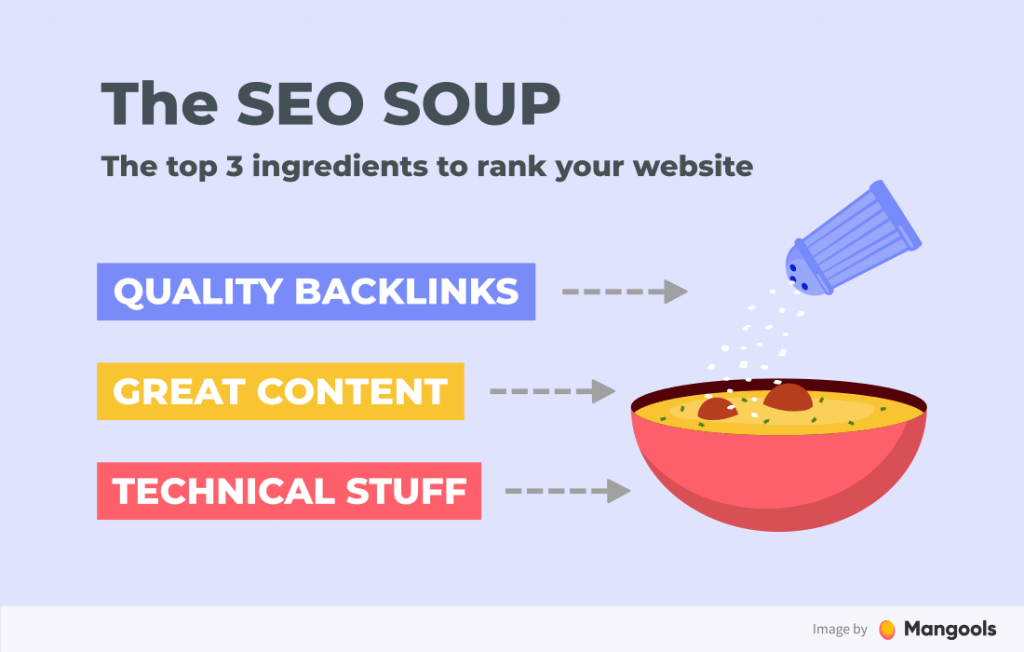
For keyword research, link-building and rank tracking for traditional and AI search engines, you can use Mangools SEO toolset and start with your SEO activities right away. The main principles of SEO are pretty straightforward:
- Perform a keyword research within your industry (to find what search queries/keywords users actually type in into the search engines)
- Create a high-quality content on your website to satisfy the search intent behind the queries and optimize your pages for those keywords.
- Find and obtain high-quality backlinks from reputable websites to build credibility and build trust in the eyes of search engines.
- Track and measure the performance of your ranking pages in the search engine (and adjust the SEO strategy if necessary.
To find keywords for which you can optimize your website (and start getting organic traffic from search engines such as Google or Bing), you can use Mangools KWFinder – a simple yet very effective keyword research tool which will help you identify keywords or even long-tail search queries and questions that people ask Google on a daily basis.
In addition, you can build valuable backlinks with Linkminer for your website and track the ranking performance of your pages with SERPWatcher for all the keywords you want to appear for in Google Search.
Besides traditional search engines, Mangools also offers a unique LLM rank tracker – AI Search Watcher – which helps you monitor your brand and website presence in popular AI search engines such as ChatGPT, Gemini, Claude, Grok, and others.
The tool is very easy to use: simply create your rank-tracking project, add a list of prompts that users might type into AI search engines (or select from the suggested ones), and you’re all set!
AI Search Watcher will then track and evaluate your presence across AI search engines and compare your brand’s performance with that of your competitors.
E-E-A-T considerations
With the introduction of Google’s E-E-A-T (Experience, Expertise, Authoritativeness, and Trustworthiness), search engines now place even greater emphasis on content quality and credibility.
Websites that demonstrate these qualities are more likely to rank higher in search results, ensuring users receive the most reliable and relevant information.
Search engines list: What are the most popular search engines?
Although there are dozens of search engines in the world, only a few of them dominate the overall search engine market and remain popular due to their quality and overall usefulness for people around the globe.
1. Google

Google Search, owned by Alphabet, Inc., is the world’s most popular search engine. As of 2024, Google boasts more than 1 billion daily active users.
In January 2024, it held a global desktop market share of 81.9%, and as of May 2024, Google Search dominated with a market share of 90.8%.
Google’s superior algorithms utilize latent semantic indexing and user behavior analysis, and provide enhanced search results such as featured snippets, organic and paid results, “People Also Ask” sections, etc.
Security and privacy features
Google prioritizes user security and privacy by encrypting all searches and using industry-leading technology to protect data.
Users can customize their privacy settings, and Google ensures that personal information is never sold.
Google blocks 40 billion spammy sites daily from search results to maintain a safe browsing environment.
| Pros | Cons |
|---|---|
| The most accurate search results | Fierce competition for organic traffic |
| Numerous filtering options | Privacy concerns |
| Enormous potential traffic |
SEO documentation
Google provides extensive SEO documentation to help improve website visibility.
The SEO Starter Guide offers best practices for easier crawling, indexing, and understanding of content by search engines.
There’s also a specific guide for web developers to optimize their sites for search.
2. Microsoft Bing
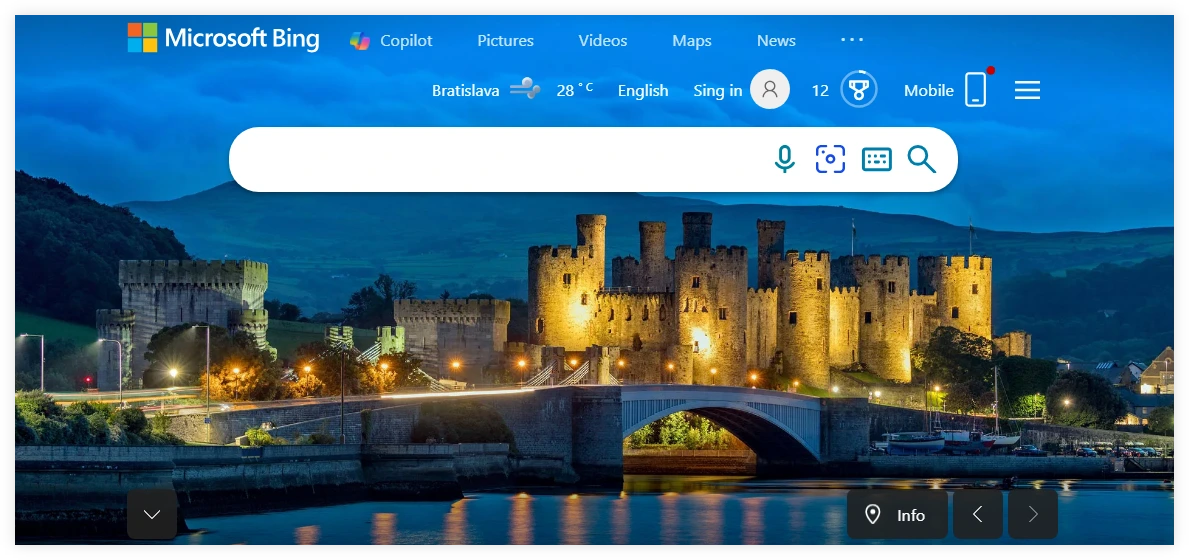
Launched in June 2009 by Microsoft, Bing is the second-largest search engine.
As of 2023, Bing has 100 million daily active users. In January 2024, its global desktop market share was 10.5%, and by May 2024, its overall market share was 3.64%.
Bing is renowned for its superior image search engine and innovative features such as visual search and AI-powered functionalities.
It focuses on shopping, travel, local, and health-related searches.
Security and privacy features
Bing emphasizes enhanced privacy and security. Microsoft Search in Bing requests are made over HTTPS, providing encrypted end-to-end connections.
Authentication is tied to Microsoft Entra ID, safeguarding user and workplace data.
| Pros | Cons |
|---|---|
| The second most used search engine | Most effective with sign-in and Edge |
| Less expensive advertising | Minimal features |
| Larger character limit for ads | Vague privacy control |
SEO documentation
Bing provides comprehensive SEO documentation to help with site visibility.
The Bing Webmaster Guidelines offer best practices, and there is a guide specifically for web developers to optimize their sites effectively.
3. Yahoo!
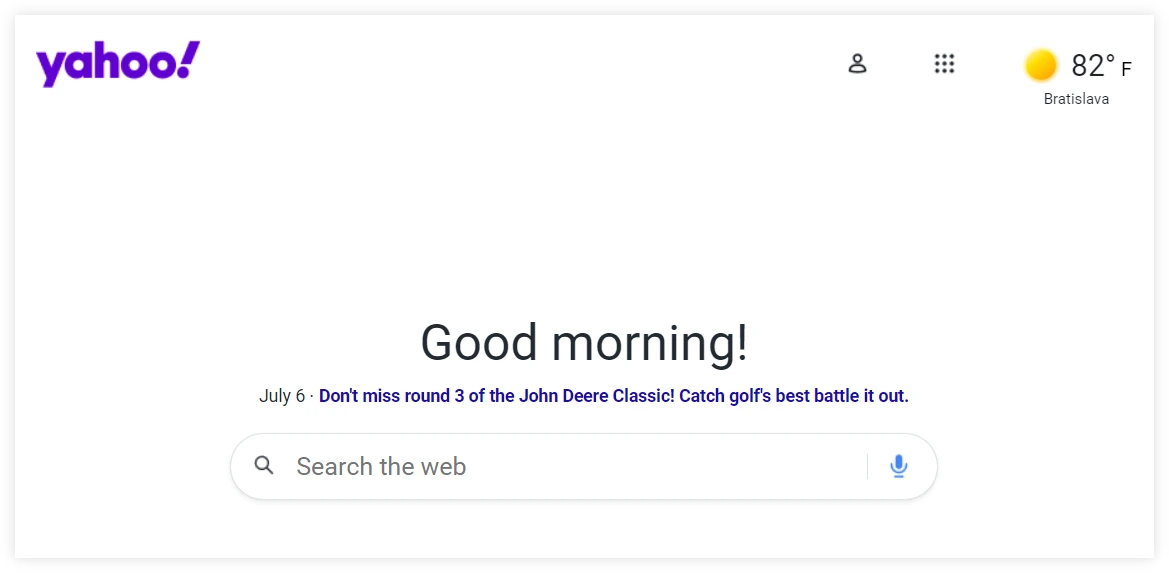
Yahoo! Search, launched on March 2, 1995, by Jerry Yang and David Filo, is powered by Microsoft Bing.
It was once a dominant search engine but has since been overshadowed by Google. Yahoo! Search also offers various services like Yahoo Mail, Yahoo Finance, Yahoo News, and Yahoo Sports.
Yahoo! Search provides answers directly on the search results page and supports larger, well-established websites more effectively than smaller, local businesses.
As of 2023, Yahoo! Search has around 700 million monthly visitors. In January 2024, its global desktop market share was 2.67%.
Security and privacy features
Yahoo! Search ensures data security with industry-leading technology and encryption. Users can customize privacy settings, and Yahoo! guarantees that personal information is never sold.
| Pros | Cons |
|---|---|
| Integrated services like Yahoo Mail and Yahoo News | Declining market share |
| Simple and easy-to-use interface | Outdated user interface compared to modern platforms |
| Strong support for larger websites | Reliance on Microsoft Bing for search engine results |
SEO Documentation
Although Yahoo! Search offers some SEO documentation in their Yahoo! Search Webmaster Guidelines, it also relies on Bing Webmaster Tools.
4. Yandex
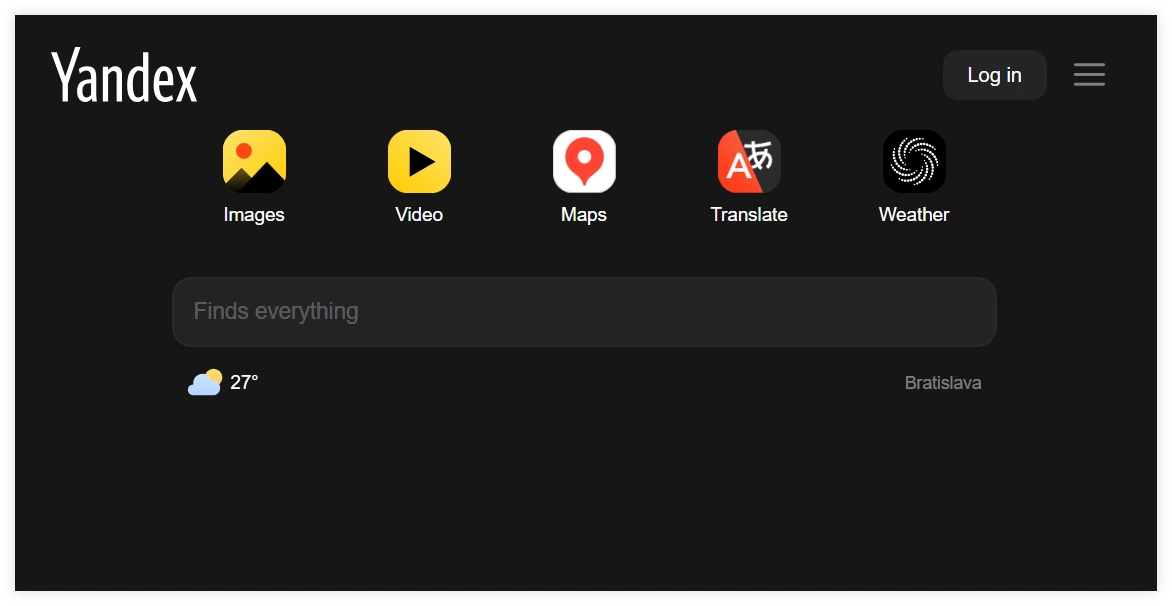
Yandex (from the term “Yet Another iNDEXer”) is a Russian search engine created by Arkady Volozh, Arkady Borkovsky, and Ilya Segalovich in May 2010.
Often called the “Google of Russia,” Yandex provides local search results and various services, including Yandex Maps, Translator, Money, and Music.
Yandex boasts 63.9 million daily users. It is particularly popular in Russia, where it holds 64% of the search market, and also in countries like Ukraine, Belarus, Turkey, the United States, and Germany.
Yandex offers local search results in over 1,400 cities. It features a “parallel” search that combines web index results with specialized information, such as news, shopping, blogs, images, and videos.
Additional features include Wizard Answer for extra information (e.g., sports results), a spell checker, autocomplete, and antivirus protection.
Security and privacy features
Yandex employs robust security measures, such as DNSCrypt, DNS spoofing protection, and auto HTTPS for public networks.
The integrated Protect system scans for viruses, blocks fraudulent websites and ads, and secures user data, including passwords and credit card information.
| Pros | Cons |
|---|---|
| Relevant local search results | Limited availability in many parts of the world |
| Unique image search options | Lacks a private mode and stores user data for 18 months |
| Customizable for different countries | Known for blocking certain search results |
SEO documentation
Yandex has a free search optimization service called Yandex Webmaster.
The service helps monitor the technical condition of your site, improve its ranking in Yandex search results and provide SEO documentation and tips for webmasters.
For more details, you can visit their official SEO guidelines.
5. Baidu
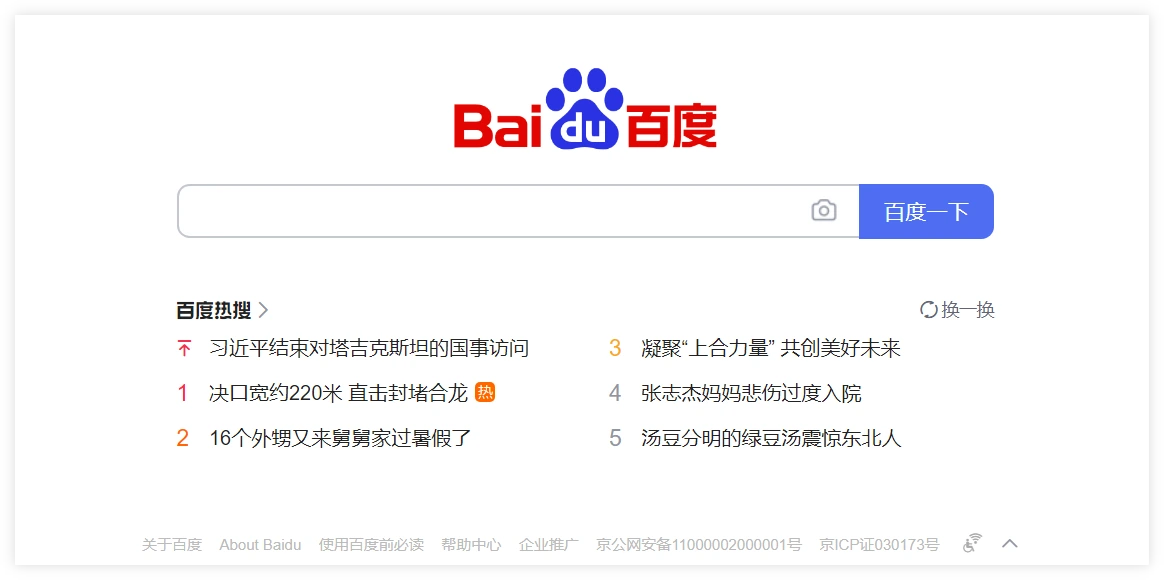
Baidu, founded by Robin Li and Eric Xu in 2000, is the leading search engine in China. As of May 2024, Baidu holds approximately 52.15% of the market share in China, with billions of searches daily.
As of December 2023, Baidu has around 667 million monthly active users, maintaining a significant presence in the Chinese search market.
Notable features include Baidu Maps, Baidu News, Baidu Baike (an online encyclopedia), and Baidu Tieba (an online community forum).
Security and privacy features
Baidu employs various security features to protect user data. Baidu Antivirus includes real-time protection, virus scanning, and other security measures.
| Pros | Cons |
|---|---|
| Relevant local search results | Limited availability outside of China |
| Comprehensive range of services and features | Some users find results less relevant |
| AI and other advanced technology | Known to block certain search results |
SEO documentation
Baidu provides its own search optimization service and documentation called Baidu Search Resource.
It helps its users to monitor the technical condition of the site, provide tips for optimization, website design and technical support.
6. DuckDuckGo
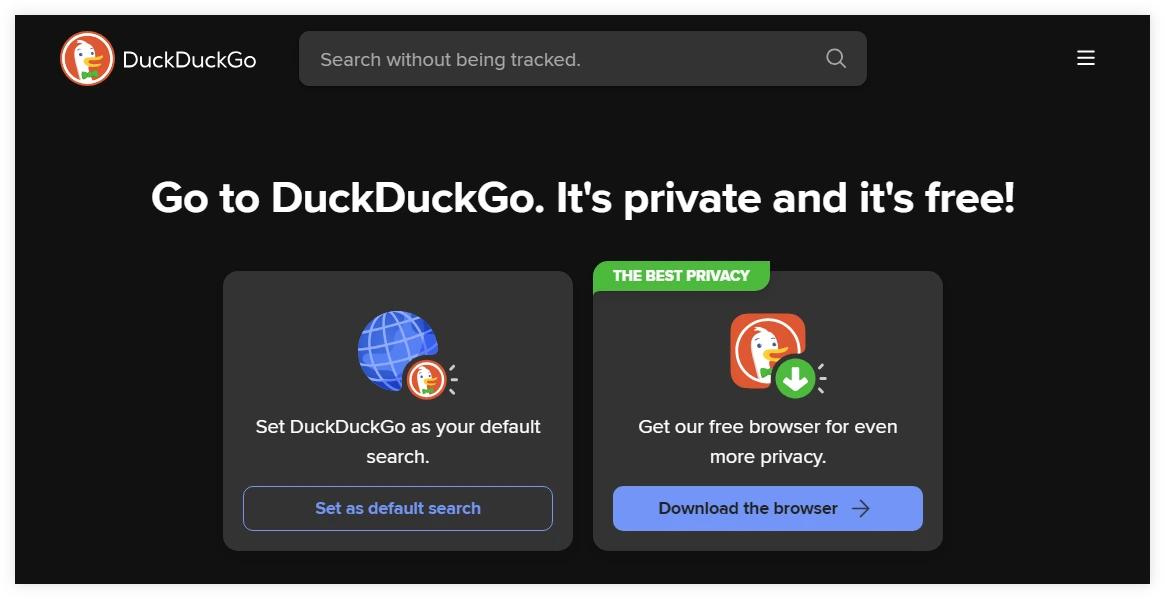
Created by Gabriel Weinberg in 2008, DuckDuckGo is an American search engine known for its strong emphasis on user privacy.
It avoids tracking and provides relevant search results without collecting personal data.
As of 2024, DuckDuckGo handles nearly 3 billion search queries monthly, averaging 100 million daily searches. It boasts over 100 million active monthly users globally.
DuckDuckGo offers unique features like bangs, tracker blocking, the Duck Player, HTTP to HTTPS encryption, and the fire button.
It also provides services such as DuckDuckGo Maps, Weather, and Local business answers.
Security and privacy features
DuckDuckGo prioritizes user privacy, avoiding the filter bubble of personalized search results. It hides user IP addresses, doesn’t use cookies by default, and employs features like malware blocking, email protection, and password management to enhance security.
| Pros | Cons |
|---|---|
| No user tracking | Limited availability in some regions |
| Comprehensive privacy and security features | |
| Customizable for different countries |
SEO documentation
While DuckDuckGo doesn’t have specific SEO documentation, universal SEO principles apply. For more information about optimization for DuckDuckGo search engine, you can check out this simple guide.
7. Ecosia

Ecosia, based in Berlin, Germany, was launched by Christian Kroll on December 7, 2009.
Ecosia stands out with its mission to plant trees and reduce CO2 emissions to combat climate change, benefiting the planet, people, and animals.
Ecosia uses ad revenue to fund tree-planting projects worldwide, having planted over 120 million trees.
By using Ecosia, users support reforestation and empower local communities involved in these projects.
Ecosia has over 20 million active users, mainly in Europe, especially Germany and France.
As of early 2024, Ecosia’s global market share is around 0.10%, with a fluctuating share between 0.51% and 1.19% in Germany.
Security and privacy features
Ecosia prioritizes user privacy by not selling data to advertisers and allowing users to turn off tracking.
Searches are encrypted, and no third-party tracking tools are used. Additionally, searches are anonymized after one week.
| Pros | Cons |
|---|---|
| Fast and relevant search results | Partnership with Bing may pose some privacy risks |
| Majority of ad revenue used for planting trees | Strong emphasis on downloading browser extensions |
| Sleek browser extensions | Sometimes the search results not very accurate |
SEO documentation
Ecosia does not have specific SEO documentation. However, universal SEO principles apply, meaning optimizations that work for Google, Bing, and Yahoo will also benefit Ecosia.
8. AOL
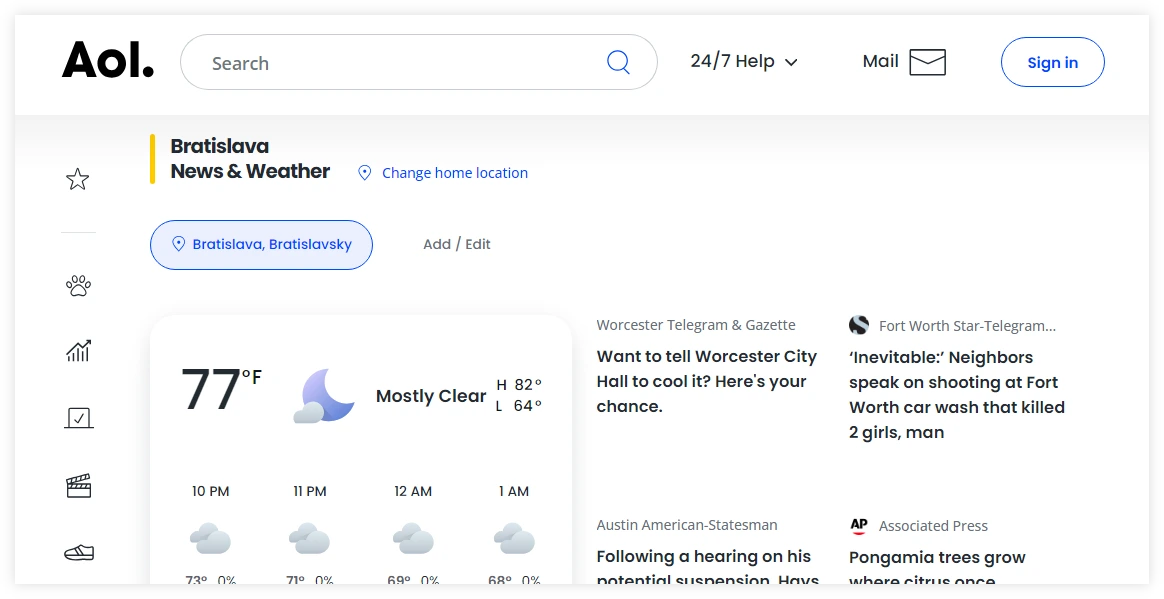
AOL (America Online) is an American web portal and online service provider based in New York City, founded by Marc Seriff, Steve Case, Jim Kimsey, and William von Meister in 1983.
It was a pioneer of the Internet in the 1990s and was once the most recognized brand on the web in the United States.
By 1995, AOL had about three million active users. At its peak, over 35 million people used AOL to connect to the internet.
AOL Search provides extensive search results along with convenient one-click access to relevant web content, including web results, images, videos, maps, and more.
Security and privacy features
Every member of Team AOL must abide by AOL’s privacy policy.
Additionally, AOL’s partner companies are required to adhere to confidentiality agreements to ensure that your information remains safe and secure.
AOL also provides tips on how to secure your computer and AOL account.
| Pros | Cons |
|---|---|
| Personalized news feeds and premium content | Lacks advanced search features |
| Straightforward search engine options | Does not use intent-based search results |
| Great for general-purpose searches |
SEO documentation
AOL Search has been powered by Bing since 2016. If you have already added your site to Bing, it should automatically appear on AOL as well.
9. Internet Archive
Internet Archive, a nonprofit organization based in San Francisco, California, created the Wayback Machine in 1996 and launched it to the public in 2001.
This digital archive allows users to view how websites looked in the past, and even on specific dates.
The Internet Archive does not publicly disclose its number of active users, but it has archived over 866 billion web pages.
Security and privacy features
The Internet Archive respects user privacy by not archiving pages requiring passwords, form submissions, or secure servers.
Some pages are excluded due to robots exclusions or direct site owner requests
| Pros | Cons |
|---|---|
| Unique search engine with huge archive | Some pages may not be archived due to various security reasons or privacy |
| Allows users to see the evolution of websites | Search functionality might not be as good as other search engines |
| Useful tool for research and investigation | Doesn’t archive dynamic content |
SEO documentation
This search engine does not provide any specific SEO documentation.
10. Swisscows
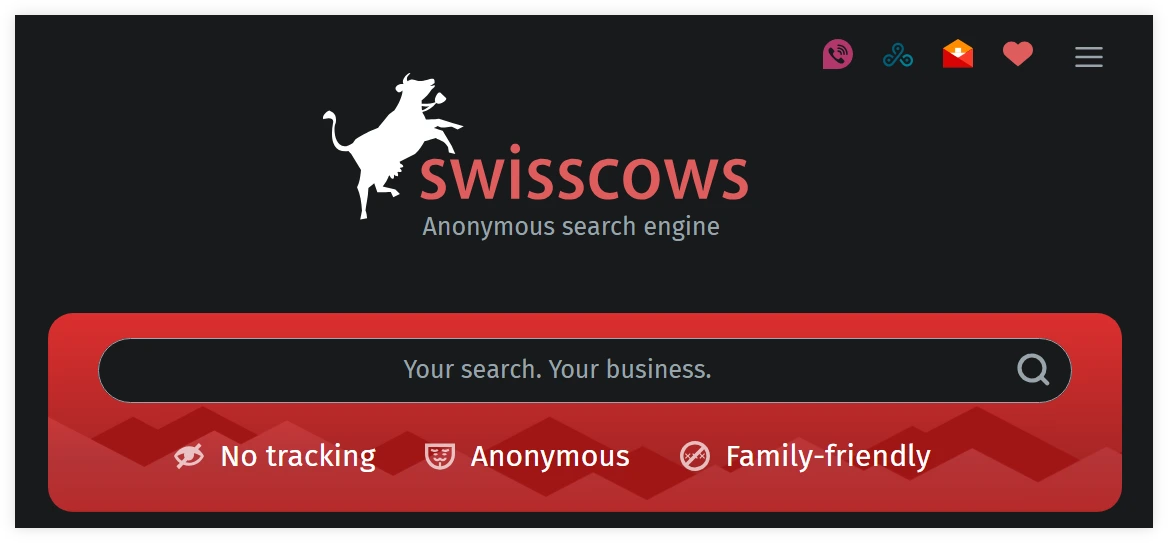
Swisscows was launched in 2014 by Hulbee AG, based in Egnach, Switzerland.
It uses semantic data recognition to provide faster answers and protection from inappropriate content along with not storing user data, making it a privacy-focused and family-friendly search engine.
The exact number of active users is not publicly disclosed, but Swisscows is popular among users who prioritize privacy and secure web searches.
Security and privacy features
Swisscows prioritizes user privacy by not using cookies or tracking technologies, and providing anonymous searches. All connections to Swisscows are secured over HTTPS.
| Pros | Cons |
|---|---|
| Anonymous search engine free of charge | Some users experience German pages dominating results |
| Strong data protection with no search query storage | Issues reported with the VPN service |
| Protects users from inappropriate content | Ads are now displayed |
| Provides fast and accurate results |
SEO documentation
Swisscows doesn’t offer SEO documentation, but optimizing for Swisscows will likely improve visibility and traffic across other search engines like Google, Bing, and Yahoo.
11. Sogou

Sogou, launched in 2004 by Sohu, Inc., is the second-largest search engine in China after Baidu.
The name “Sogou” means “searching dog” in English. It has developed its own algorithm called the Sogou Rank Index.
Sogou has a massive audience reach with more than 500 million monthly active users.
Sogou’s unique features include advanced language input methods, voice search capabilities, and AI-powered translation services.
It is the only search engine allowed to crawl public messages on Tencent’s WeChat platform.
Security and privacy features
A semi-recent report revealed a significant security loophole in Sogou’s encryption system, which could intercept and decrypt users’ input in real time.
Acquired by Tencent in 2021, Sogou quickly fixed this loophole, but concerns remain about potential vulnerabilities.
| Pros | Cons |
|---|---|
| Second most used search engine in China | Previous security loopholes |
| Massive audience | Potential for other vulnerabilities |
| Advanced language input, voice search, AI translation |
SEO documentation
Sogou’s SEO metrics value website authority, indicated by its “SogouRank” index.
Setting up Sogou Webmaster Tools can help analyze and improve your site’s performance on this search engine. For more SEO tips for Sogou optimization, check out this simple guide.
12. Haosou

Also known as 360 Search, Haosou is part of Qihoo 360 Technology Co. Ltd., which offers various internet security products.
Launched in 2012, it quickly became the second most popular search engine in China, holding over 35% of the market share by the end of 2014.
It provides a wide range of search options, including News, Web, Q&A, Video, Images, Music, Maps, Doctors, Wiki, and more.
It strategically integrates within the Tencent ecosystem, which helps improve services.
Security and privacy features
Haosou has implemented numerous security features to combat counterfeit products and scams.
It also provides a compensation scheme for users defrauded by websites while using Qihoo 360’s products, including its antivirus, browser, and Haosou search engine.
| Pros | Cons |
|---|---|
| Comprehensive search experience | Still catching up with Baidu |
| Strategic role within the Tencent ecosystem | User demographics are very similar to other platforms |
| Improved security features |
SEO documentation
General SEO principles are applicable, and there is no specific documentation. For more information about SEO for this search engine, check out this article.
13. Shenma

Shenma, a mobile-first search engine launched in 2014 by Alibaba Group in collaboration with UCWeb, is primarily used by mobile users in China.
Shenma, which means “mythical horse” in English, aims to provide fast, efficient, and relevant search results tailored for mobile users.
Shenma receives over 120 million monthly visits. As of February 2024, it is ranked the 4th most preferred search engine in China, with a 3.04% market share.
Shenma focuses on online products such as retail, books, and apps.
It integrates with the UC Browser to prioritize e-commerce results and offers a vast indexed collection of buyer reviews, verifications, and reference data to aid Chinese consumers in making informed purchasing decisions.
Security and privacy features
While specific security and privacy features of Shenma are not readily available, it is subject to China’s strict Internet regulations, like other Chinese search engines.
| Pros | Cons |
|---|---|
| Provides fast, efficient, and relevant search results | Censored search results |
| Prioritizes e-commerce results | |
| Vast collection of buyer reviews and reference data |
SEO documentation
To effectively optimize websites for Shenma, businesses can leverage tools like Shenma Webmaster Tools. If you would like to learn more about optimization for Shenma search engine, make sure to read this simple SEO guide.
14. Seva
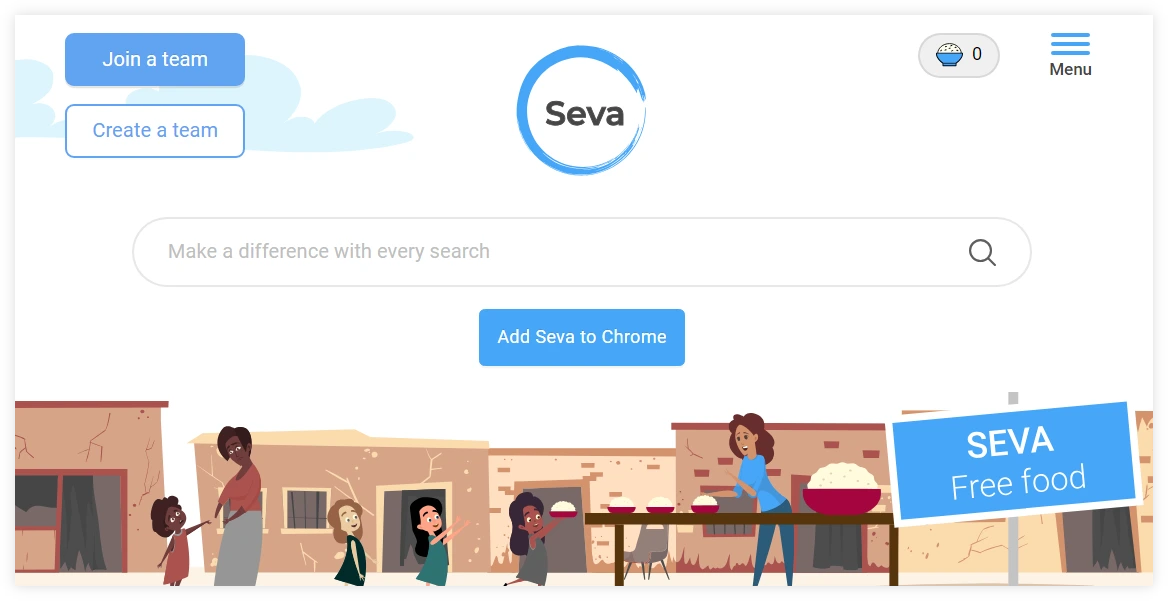
Seva is a search engine designed to make a positive impact, with the name “Seva” meaning “selfless service” in Sanskrit.
It aims to help those in need, particularly in the area of food drives and security, and operates as a public benefit organization. It also has a ‘teams’ function where users can join together to make a difference.
The exact number of active users for Seva is not disclosed, but it has over 1,000 users on the Chrome Web Store.
Security and privacy features
Seva prioritizes user privacy and does not track its users. It only counts the number of searches to calculate the benefits created.
| Pros | Cons |
|---|---|
| Access to vast information easily | Limited user base compared to other search engines |
| Does not track users | Dependent on ad revenue for charitable donations |
| Donates search revenue to charity |
SEO documentation
Specific SEO documentation for Seva is not available, but general SEO principles apply.
15. Startpage
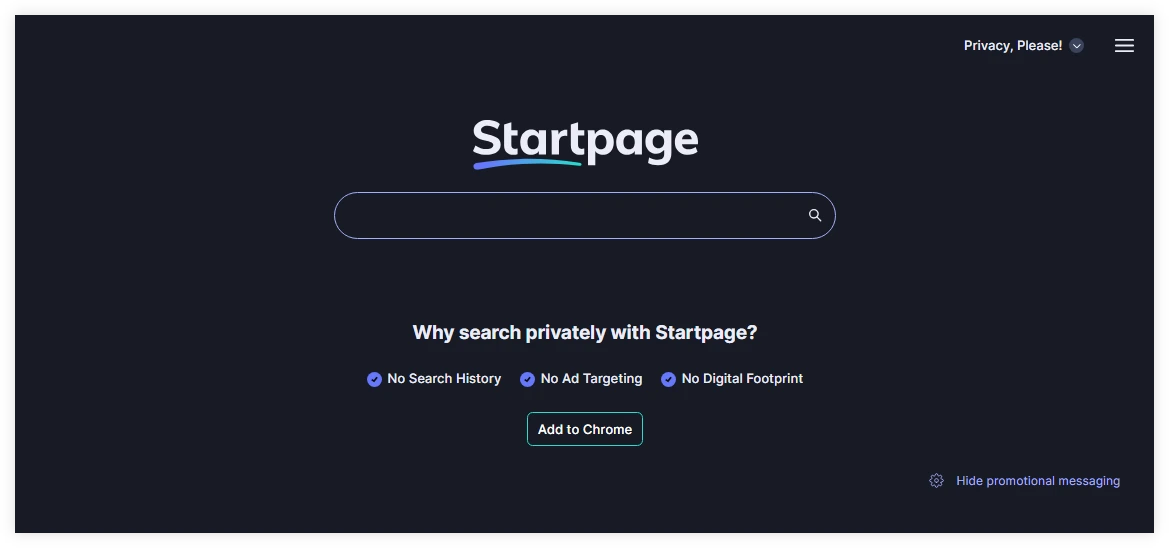
Startpage, a Dutch search engine company, focuses on privacy as its key feature.
It was created to raise awareness of and protect people’s right to privacy, offering an alternative to Google while still providing access to Google’s powerful search results.
Startpage offers several unique features.
The Anonymous View feature allows users to visit and explore websites without leaving a trace, and the Private Language Translation lets users translate text without surveillance.
The Private Stock and Company Information feature lets users find information without tracking.
Security and privacy features
Startpage prioritizes user privacy with full HTTPS/TLS encryption, anonymous website viewing via proxy, no logging of user searches, minimal use of cookies, secure email, and no targeted ads.
It does not store personal information or search data and removes all trackers.
| Pros | Cons |
|---|---|
| Does not track users | Limited customization options |
| Delivers Google search results | Lacks Google’s helpful info boxes |
| Anonymous View feature | Based in one of the Nine Eyes countries |
SEO documentation
SEO documentation for Startpage is not available.
16. Yippy
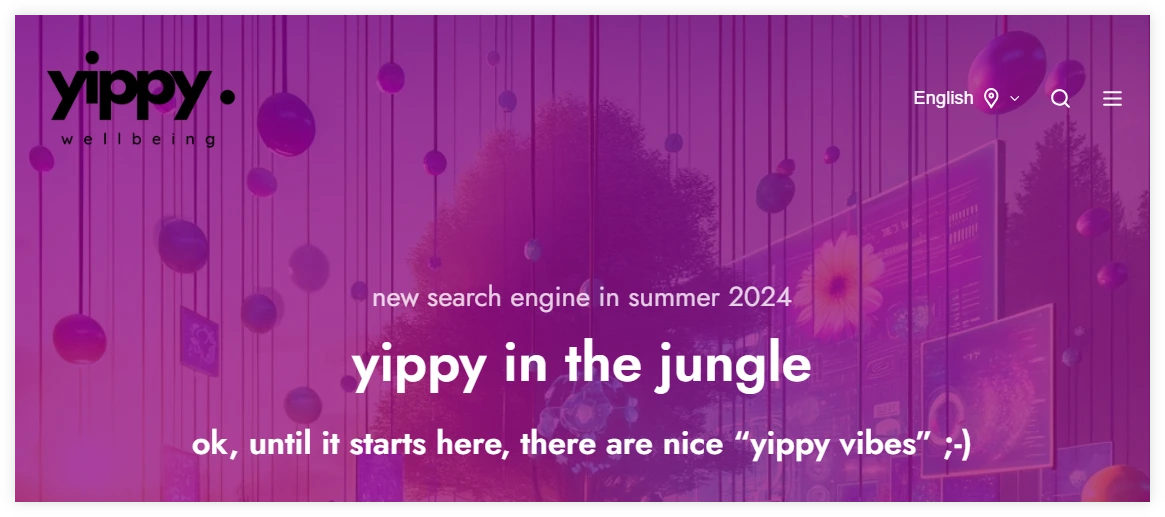
Yippy, originally developed by Vivísimo in 2004 under the name Clusty, is a metasearch engine that groups search results into clusters.
Developed by researchers at Carnegie Mellon University, it was acquired by IBM and sold in 2010 to Yippy, Inc.
Yippy offers bespoke search-related services for corporate clients, providing a fast, intuitive way to search through large amounts of data.
It supports advanced query syntax and combines search results into clusters, offering several ways to manipulate these groupings.
The website once received 100,000 unique visitors a month, but the current number of active users is not disclosed.
Security and privacy features
Yippy claims to provide enhanced security with “field level security” to keep client searches confidential, primarily intended for companies with complex IT networks.
| Pros | Cons |
|---|---|
| Does not track users | Limited user base |
| Unique clustering of search results |
SEO documentation
Specific SEO documentation for Yippy is not available.
17. Dogpile
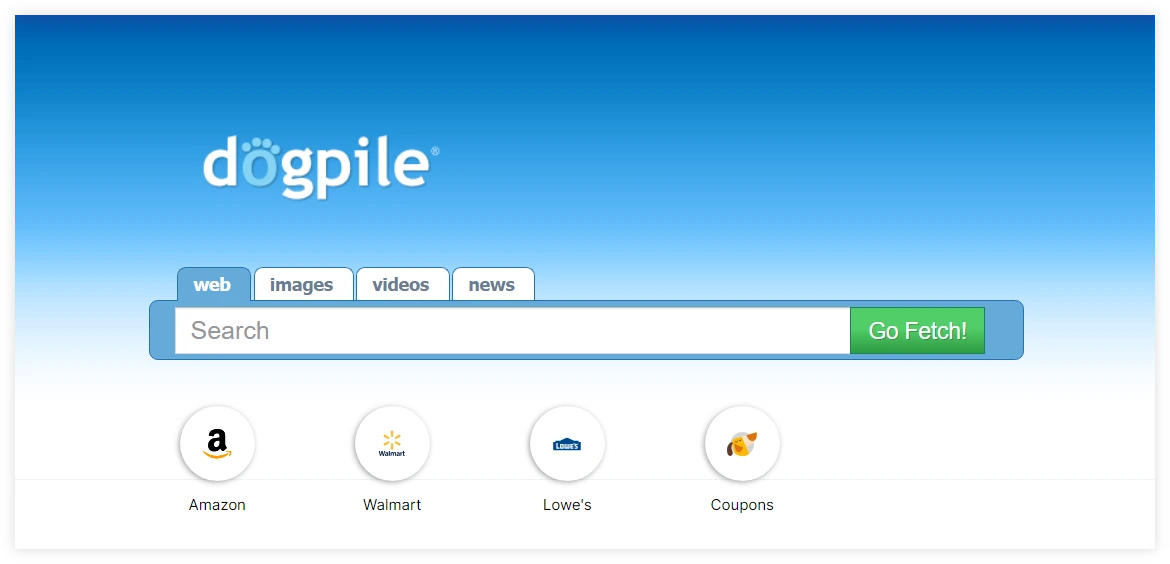
Dogpile is a metasearch engine created by Aaron Flin in November 1996.
It fetches results from Google, Yahoo!, Yandex, Bing, and other popular search engines, aiming to better search results by pulling data from multiple indexes.
It also offers options for specific category searches and displays a list of “favorite fetches,” or the day’s most popular searches.
Security and privacy features
Dogpile prioritizes user security and privacy, though it is not the best choice for complete anonymity. It collects various data about users and their devices and uses it for targeted ads.
| Pros | Cons |
|---|---|
| Comprehensive results from multiple engines | Collects user data for targeted ads |
| Simple and easy-to-use interface | Ad-heavy, requiring users to scroll through ads |
SEO documentation
Specific SEO documentation for Dogpile is not available.
18. Seekr
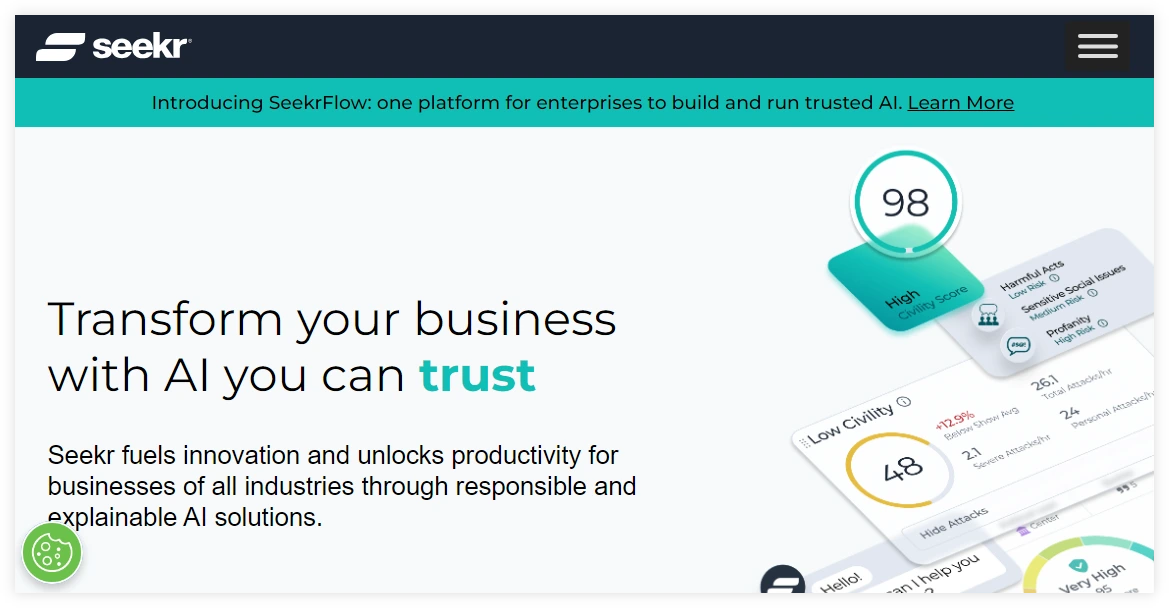
Developed to empower users to access trustworthy information at scale, Seekr uses AI to analyze the reliability of information and provides insights at the URL level.
Some unique features include the Seekr Score, which uses AI to analyze the reliability of news search results.
The Political Lean Indicator identifies any political bias in articles, allowing users to view content from across the political spectrum.
Users can define their search experience using scoring filters, and Seekr is building its own independent search index.
Security and privacy features
Seekr includes a customizable ad and tracker blocker, anti-phishing and malware detection, and a built-in VPN.
The browser encrypts data with automatic HTTPS protection, even for websites that don’t offer it.
| Pros | Cons |
|---|---|
| Uses AI to score news articles for reliability | Not as widely used as other search engines |
| Indicates political leaning of each link | Currently focused on news stories |
| Offers hefty privacy features |
SEO documentation
Specific SEO documentation for Seekr is not available.
19. WolframAlpha
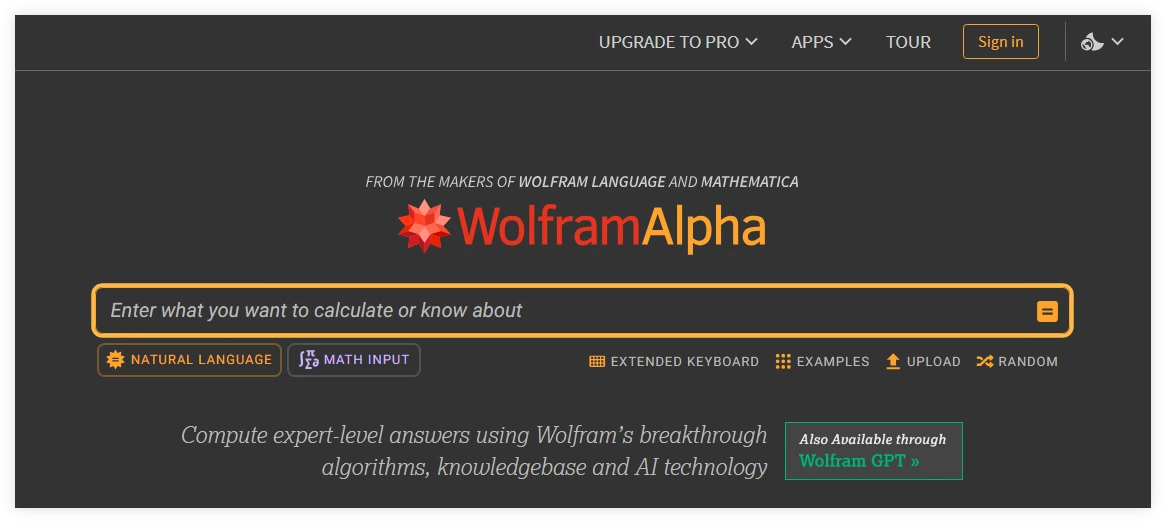
WolframAlpha is an answer engine developed by Wolfram Research and launched on May 18, 2009.
It answers factual queries by computing answers from externally sourced data, drawing from academic and commercial websites like the CIA’s The World Factbook, the United States Geological Survey, and more.
WolframAlpha’s unique features include a knowledge engine that computes answers and visualizations from a curated knowledge base.
It utilizes natural language processing to respond to fact-based questions and can parse mathematical symbolism to provide numerical and statistical results.
Security and privacy features
WolframAlpha is not a private search engine. It collects user information as outlined in its privacy policy, which can be disclosed to third parties and used for Wolfram’s mailing list
| Pros | Cons |
|---|---|
| Easy to use | Some features may have occasional bugs |
| Provides instant answers | |
| Versatile functionality |
SEO documentation
Specific SEO documentation for WolframAlpha is not available.
20. Mojeek
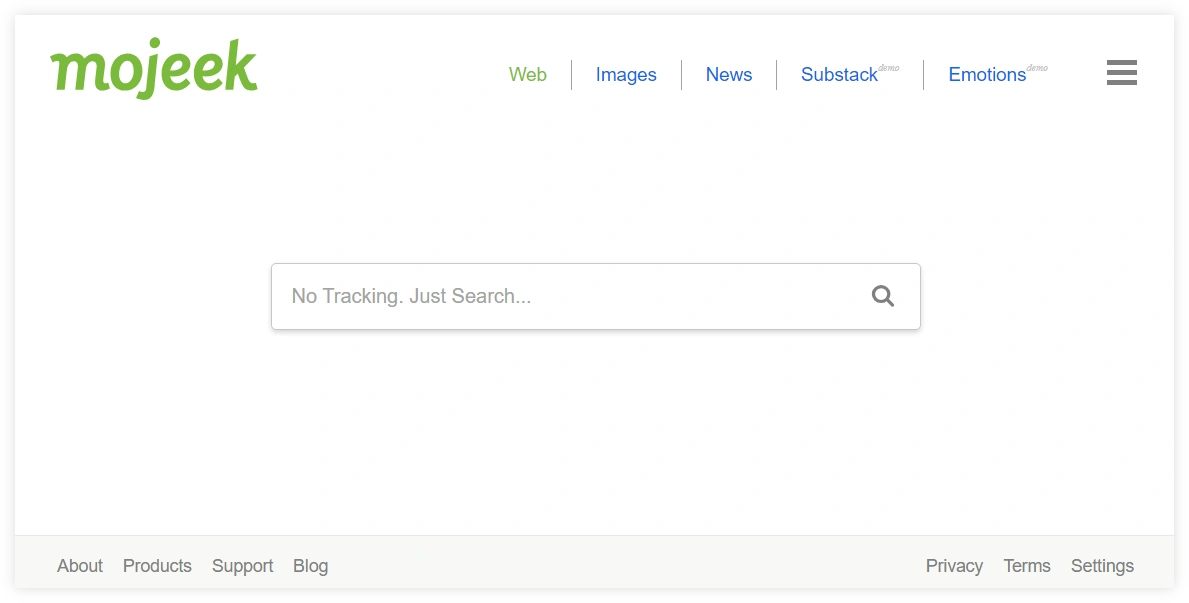
Mojeek is a UK-based search engine that provides unbiased, fast, and relevant search results with a no-tracking privacy policy.
It started as a personal project in 2004 and became Mojeek Limited in 2009.
Mojeek is a crawler-based search engine using its own index of web pages, delivering search results based solely on their relevance to the query.
Security and privacy features
Mojeek prioritizes user security and privacy by not tracking users and not storing any identifying information, such as IP addresses, search history, or click behavior.
| Pros | Cons |
|---|---|
| Does not track users | Limited user base |
| Independent indexing | Mixed reviews regarding search results and speed |
| Provides unbiased search results |
SEO documentation
Mojeek offers an API providing full access to its general web search results.
This API is intended for individuals and organizations looking to integrate site or web search into their websites and applications.
There is also a Mojeek Community Discourse where you can find many discussions and feedback between webmasters about optimization for this particular search engine.
21. Naver
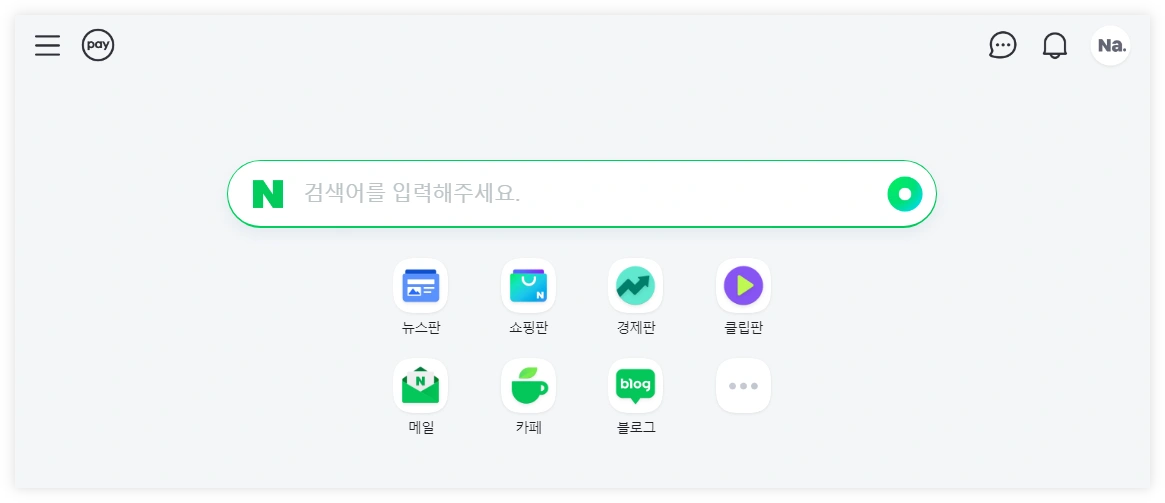
Often referred to as the “Korean Google,” Naver was launched in 1999 by Naver Corporation, a South Korean media and technology conglomerate.
It was the first web portal in South Korea to develop and use its own search engine, introducing the “comprehensive search” service, which collects information from various sources and presents it on a single page.
As of May 2023, Naver has an average of 38.8 million monthly active users, representing 75% of South Korea’s population.
Naver’s unique features include comprehensive search results, a web portal-like interface providing easy access to a range of online services, and integrated services such as digital payments, dictionaries, translators, and a music streaming platform.
Security and privacy features
Naver’s privacy and security practices may vary based on usage, region, and age. The developer provides this information and may update it over time.
| Pros | Cons |
|---|---|
| Provides comprehensive search results | Primarily caters to the Korean market |
| Easy one-point access to a range of services | Non-Korean speakers may face language barriers |
| Integrated services like digital payments and music streaming | Limited integration with third-party apps and services |
SEO documentation
Naver offers various properties that complement its search engine, including Naver Blog, Naver Cafe, Naver News, Naver Shopping, Naver Encyclopedia, Knowledge iN, Naver Posts, Naver Maps, Naver Blogs, and Naver Cafe.
22. Perplexity.ai
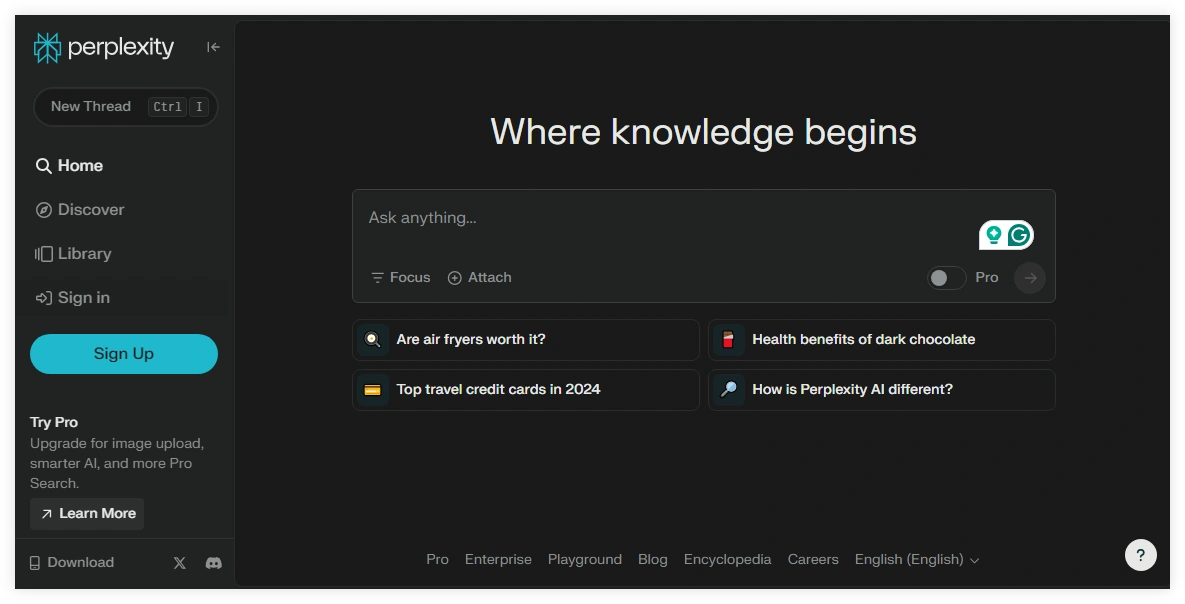
Perplexity.ai (which was launched in 2022) is an AI-powered conversational search engine designed to provide concise answers to user queries.
It aims to empower businesses, creators, and decision-makers by offering trustworthy information at scale and analyzing the reliability of information at the URL level.
As of 2024, Perplexity.ai has approximately 10 million active monthly users. In 2023, it served over 500 million search queries.
Perplexity.ai offers a conversational interface allowing users to ask questions naturally.
It pulls results from diverse sources, including the entire internet, academic papers, Reddit, YouTube, and Wikipedia.
The search engine performs real-time web searches and provides transparent source citations for every answer.
Security and privacy features
Perplexity.ai protects customer data privacy by not using it to train its language models and deletes queries after seven days.
It holds a SOC2 Certification, ensuring compliance with industry security standards, and has enhanced security alerts for new file uploads.
| Pros | Cons |
|---|---|
| Provides accurate search results and detailed reports | Much smaller user base compared to Google and Bing |
| Combines search engine usefulness with AI chatbot capabilities | Room for improvement in indexing |
| Includes images, footnotes, and links |
SEO documentation
Specific SEO documentation for Perplexity.ai is not available.
23. You.com
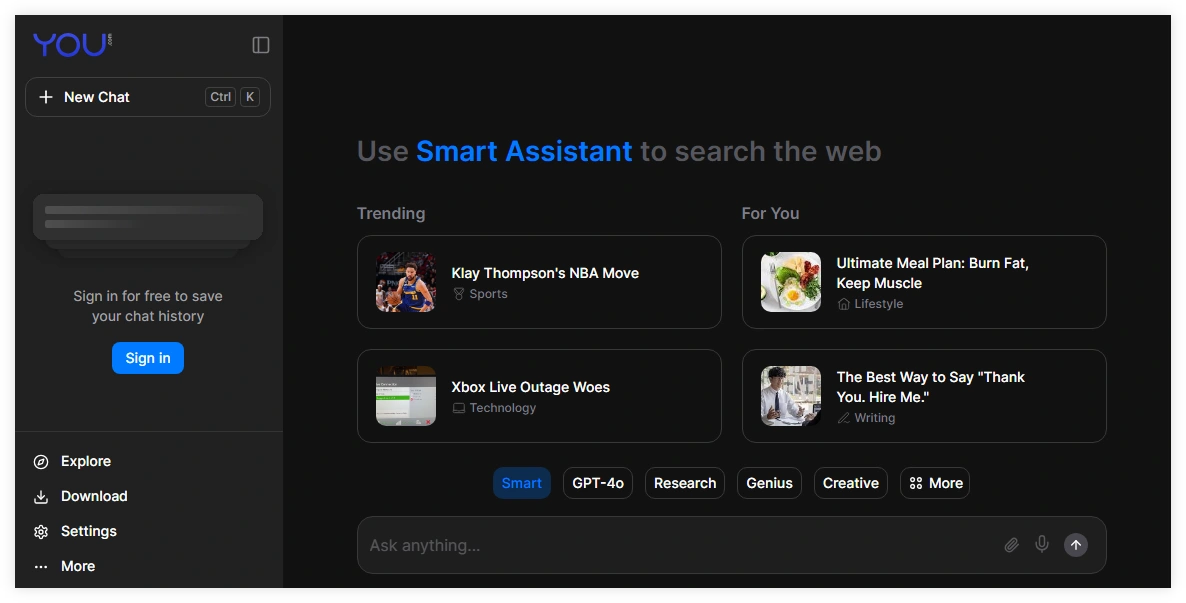
You.com is an AI-powered conversational search engine launched in 2022.
It gives businesses, creators, and decision-makers providing trustworthy information at scale. The search engine uses AI to analyze the reliability of information and provides insights at the URL level.
As of mid-December 2022, You.com had surpassed one million active users, with searches growing by over 400% in six months.
Security and privacy features
You.com focuses on privacy with a no-ads policy, avoiding first pages modified by paid interests, and ensuring secure, confidential AI assistant usage.
| Pros | Cons |
|---|---|
| AI chatbot | Smaller user base |
| AI image generator and writer | |
| Text-to-code feature |
SEO documentation
Although there are no official SEO guidelines for this search engine, You.com offers an API providing full access to its general web search results.
This API is intended for individuals and organizations wanting to embed site or web search into their websites and applications.
Yep.com
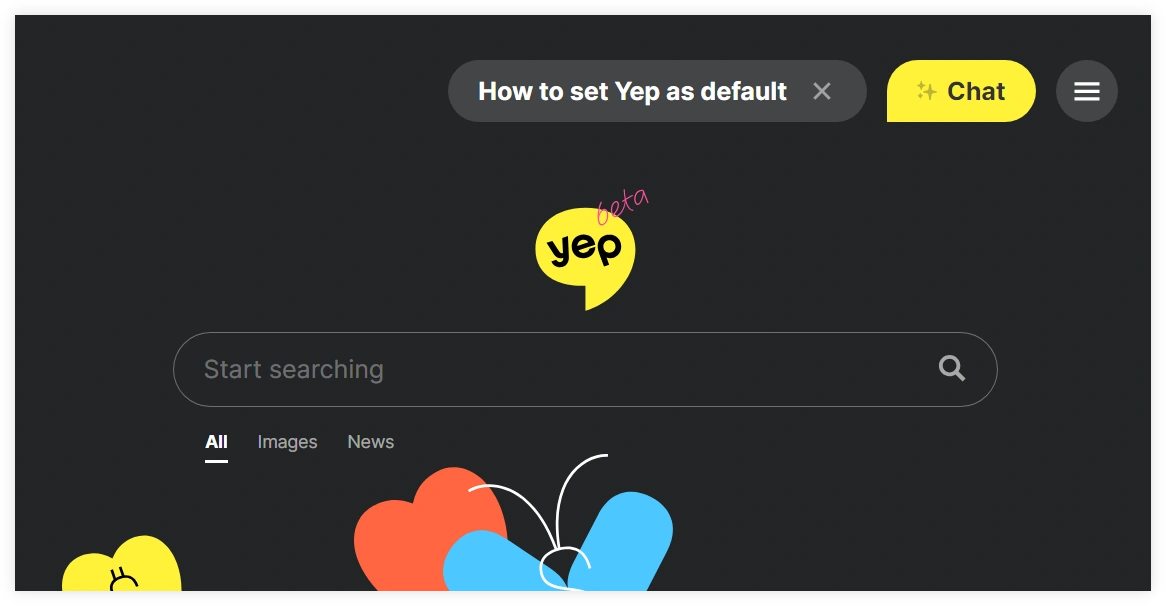
Developed by Ahrefs, Yep.com is a newer search engine focusing on privacy and rewarding content creators.
It collects minimal user data and aims to share 90% of ad revenue with the creators of the content displayed in search results, supporting high-quality content.
Security and privacy features
Yep.com claims to be the world’s most private search engine, prioritizing user privacy and data protection.
It does not collect personal information such as geolocation, name, age, or gender by default.
| Pros | Cons |
|---|---|
| 90/10 revenue share model supporting creators | Not ideal for local search results |
| Strong privacy focus | Lacks in understanding search intent |
| Experienced development team |
SEO documentation
Specific SEO documentation for Yep.com is not currently available.
25. Openverse
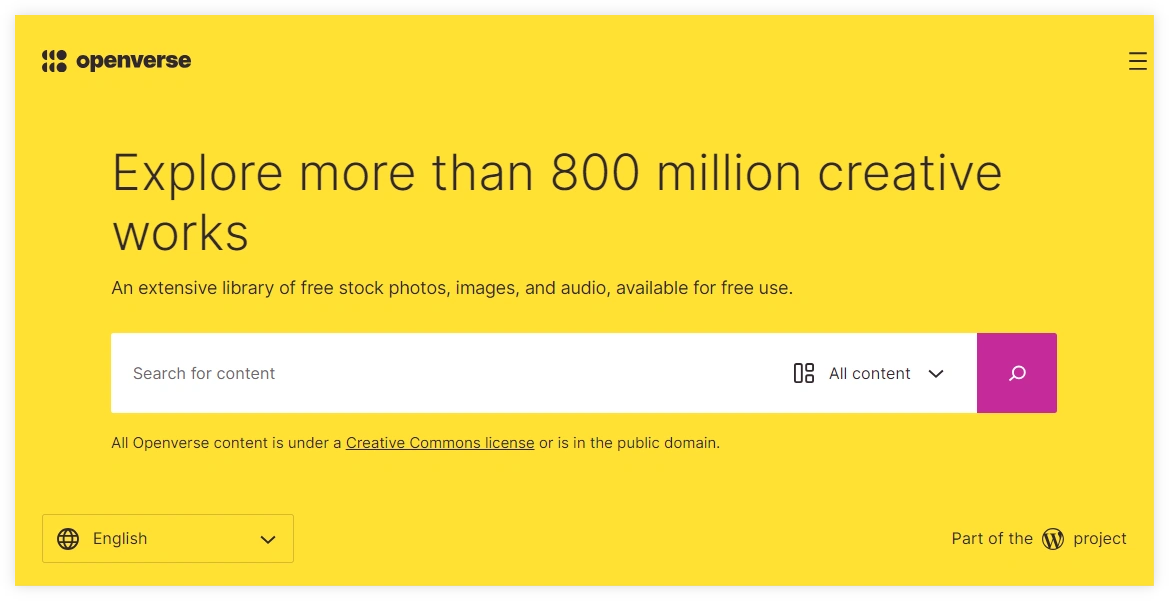
Openverse was made as part of the WordPress project, allowing the discovery and use of openly licensed and public domain works
It searches across more than 700 million images and audio tracks from open APIs and the Common Crawl dataset, facilitating reuse through features like one-click attribution.
It succeeded CC Search, launched by Creative Commons in 2019.
Openverse offers unique features, including one-click attribution for easy reuse of content, comprehensive search across a large database of images and audio tracks, and the use of open APIs and the Common Crawl dataset to provide extensive search results.
Security and privacy features
Openverse adheres to the privacy policy of WordPress.org websites.
However, it does not verify licensing information for individual works or the accuracy of generated attributions.
| Pros | Cons |
|---|---|
| Access to openly licensed and public domain works | Limited to images and audio tracks |
| One-click attribution for easy reuse | Does not verify licensing information or attribution accuracy |
| Comprehensive search across a large dataset |
SEO documentation
There is no SEO guidelines for Openverse, however, you can always check out its official documentation about the search engine and its development.
26. Gibiru
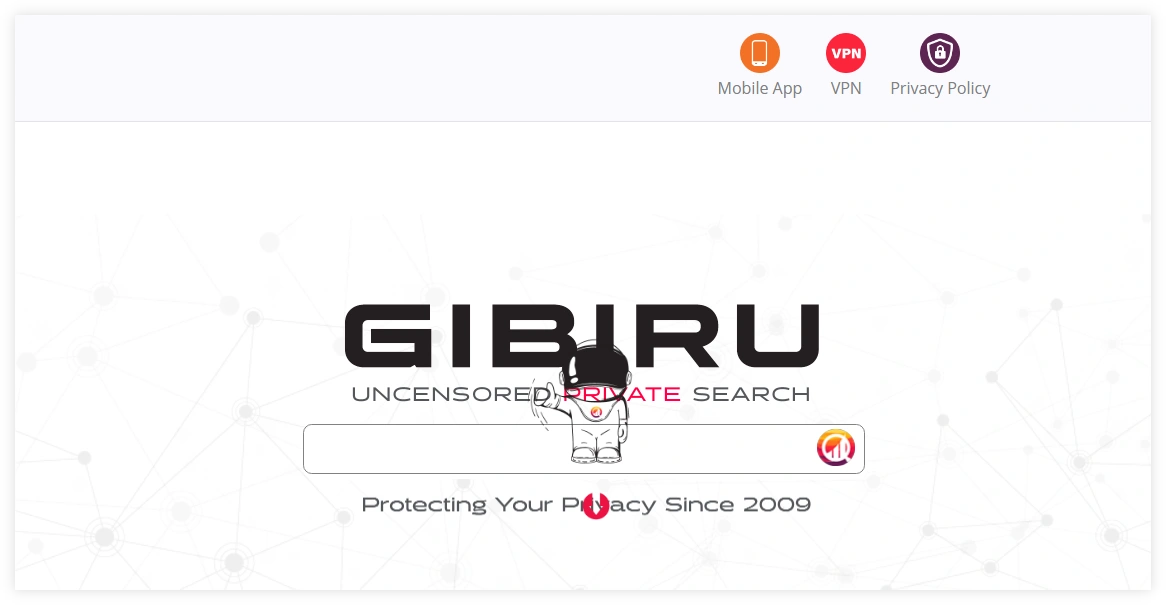
Gibiru is a privacy-focused search engine developed as an alternative to conventional search engines.
It doesn’t track users or store their search data, providing a more secure browsing experience.
Gibiru displays uncensored search results, allowing access to information that might be restricted or filtered on other platforms.
Security and privacy features
Gibiru prioritizes user privacy with full 256-bit HTTPS encryption, no tracking cookies, no data selling, and no logs.
It also offers a Virtual Private Network (VPN) for anonymous searching.
| Pros | Cons |
|---|---|
| Strong privacy protection | Lack of customization due to no user tracking |
| Uncensored search results | It sometimes provides irrelevant or generic search results |
| Built-in torrent search |
SEO documentation
Specific SEO documentation for Gibiru is not available.
27. Brave
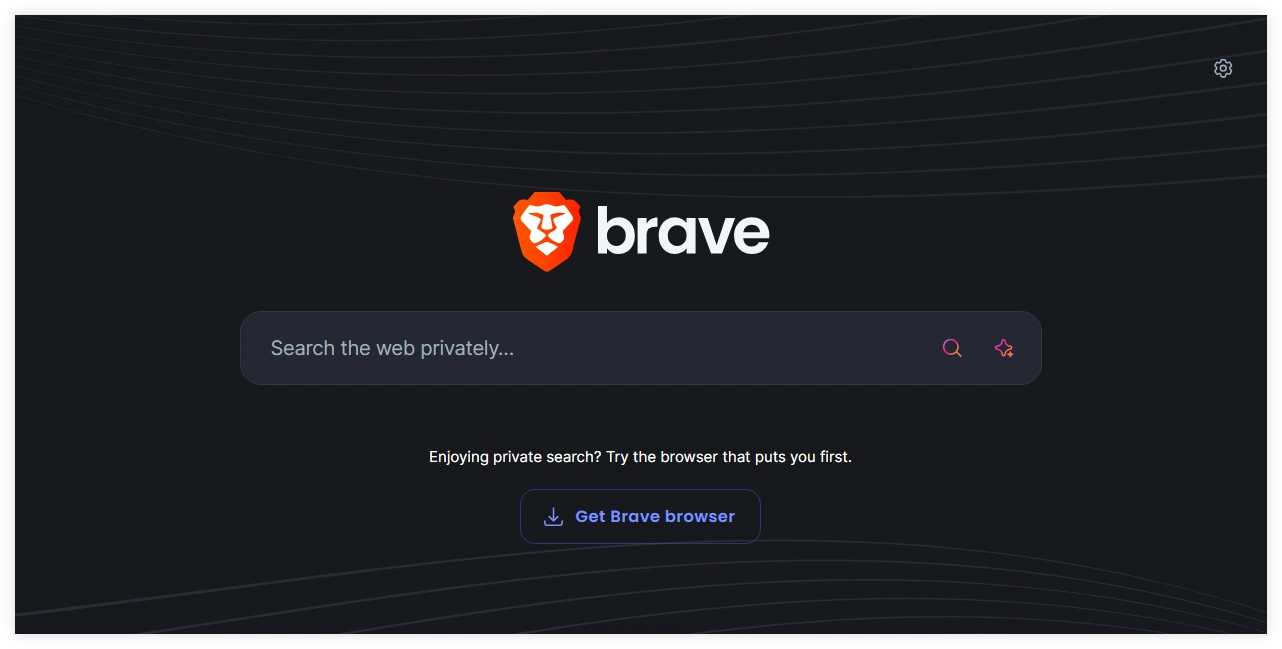
Brave does not track users or store their search data, ensuring a more secure browsing experience.
Brave provides search results without filtering or censorship, offering access to a wider range of information.
As of March 2024, Brave reported more than 73.32 million monthly active users and 26.26 million daily active users.
Brave’s unique features include anonymous browsing, an ad-free premium version, a community-curated search ranking system, and results from its independent index without any search algorithm.
Security and privacy features
There are many privacy features on Brave. Brave Shields block trackers and fingerprinting, and the browser uses HTTPS Everywhere for secure connections, offers private windows with Tor, as well as advanced protections like reduced network server calls and bounce tracking prevention.
| Pros | Cons |
|---|---|
| Strong privacy protection | Sometimes provides irrelevant or generic search results |
| Original webpage index system | |
| Brave links to original sources |
SEO documentation
Brave has an API providing full access to its general web search results. Although it does not have its own original SEO guidelines, it has a community SEO forum where webmasters discuss optimization tips for Brave.
28. MetaCrawler
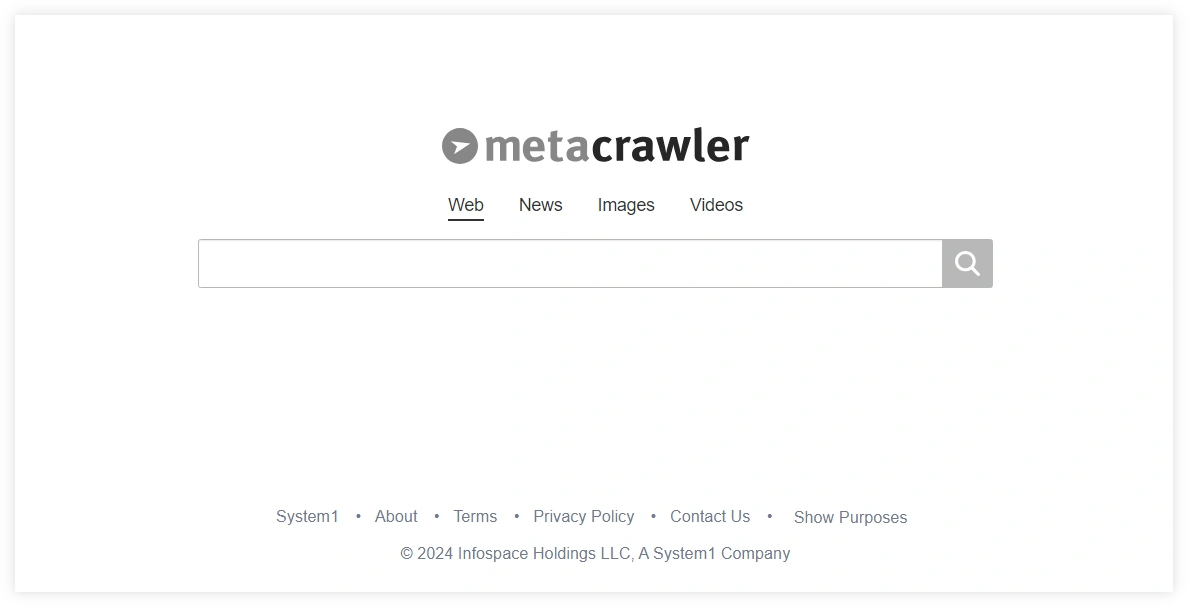
Created by Erik Selberg at the University of Washington in 1995, MetaCrawler is a metasearch engine that aggregates results from multiple sources like Google, Yahoo!, and Bing.
Initially developed to study the semantic structure of the web, it also provides searches for images, videos, news, directories, and more.
It offers advanced search functions like Boolean operators and has a minimalist user interface for clear results display.
Security and privacy features
While MetaCrawler provides comprehensive results and advanced options, it shares search history across multiple engines, which could raise privacy concerns.
| Pros | Cons |
|---|---|
| Provides comprehensive results | Potential privacy concerns due to shared search history |
| Advanced search options | Limited customization features |
SEO documentation
Specific SEO documentation for MetaCrawler is not available.
29. Qwant
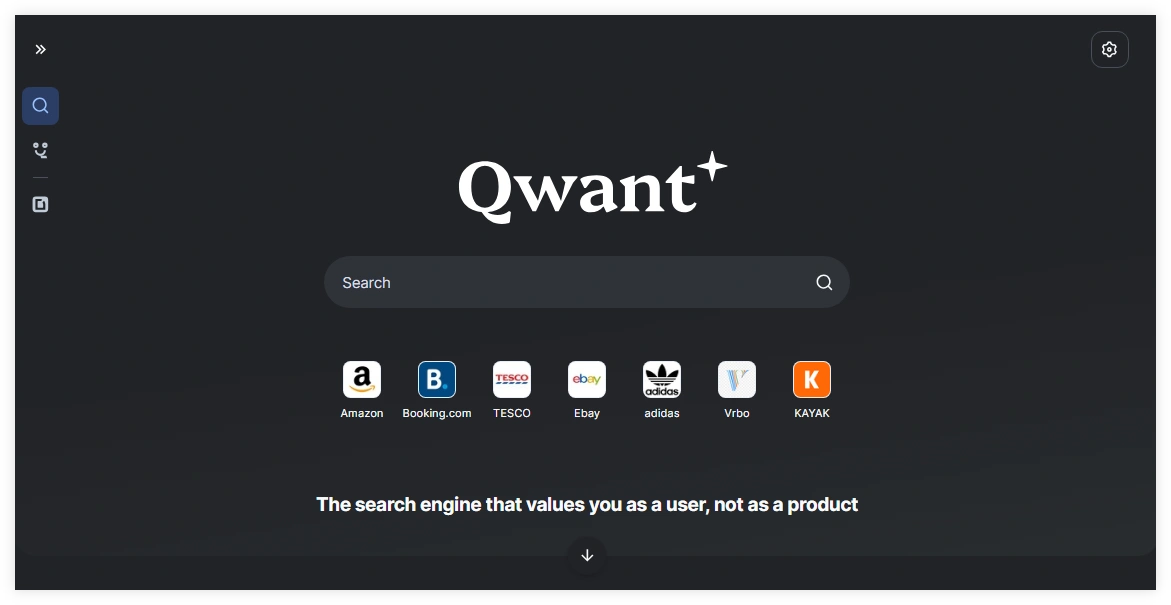
Qwant, a French search engine launched in February 2013, is dedicated to user privacy, ensuring no tracking or resale of personal data.
Interestingly, Qwant is built on its own web index and innovative technologies.
It supports multiple languages, display modes, and filters. Additionally, search history is automatically deleted when the browser is closed.
Security and privacy features
Qwant emphasizes user privacy by avoiding trackers and cookies.
It does not store or sell search data, encrypts all queries, and is hosted in Europe to comply with stringent privacy laws.
| Pros | Cons |
|---|---|
| Strong privacy protection | Requires a custom cookie to save site preferences |
| Independent indexing | Does not remember previous searches |
| Multiple languages, display modes, and filters |
SEO documentation
Information about Qwant’s algorithms and ranking criteria is limited. For more information about how Qwant works, make sure to check out this simple article.
30. Cốc Cốc Search
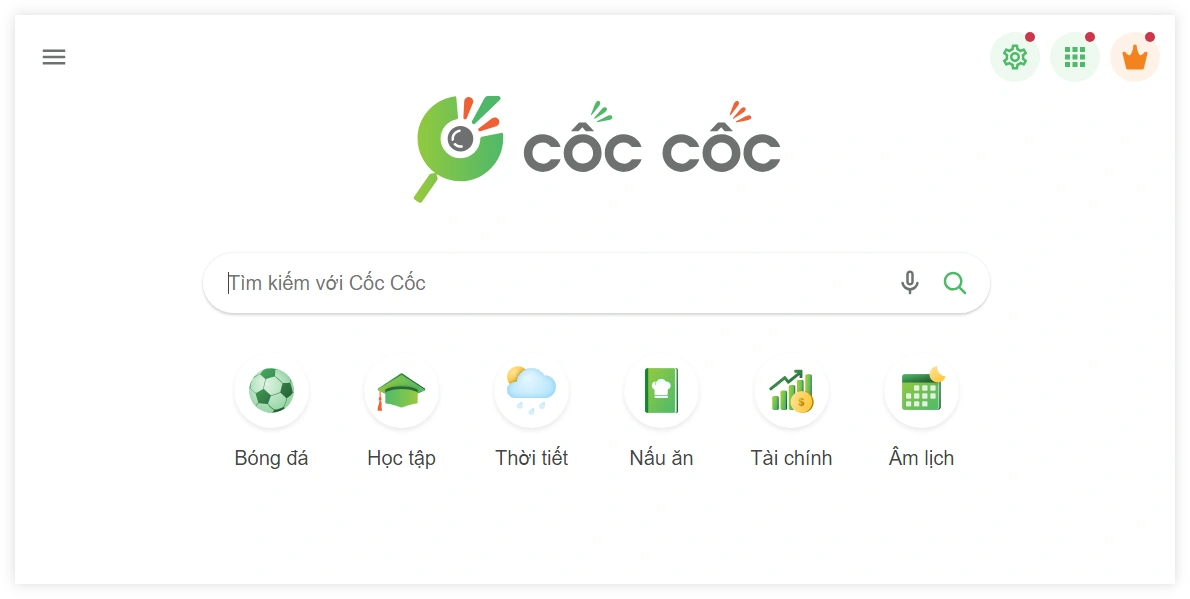
Cốc Cốc is a Vietnamese search engine launched in 2013 by a Hà Nội-based tech company.
It specializes in optimizing search results for Vietnamese users, making it the second most popular browser in Vietnam after Google Chrome.
As of 2023, Cốc Cốc boasts over 21 million unique active users monthly, demonstrating significant local popularity.
It has advanced Vietnamese language processing to optimize search results, a built-in proxy for Facebook access without additional software, a local DNS for better speed and reliability, and the ability to download and resume media without external software.
Security and privacy features
Cốc Cốc helps guarantee user safety by avoiding trackers and cookies and provides alerts for unsafe websites.
| Pros | Cons |
|---|---|
| Optimized Vietnamese search results | Smaller user base compared to global search engines |
| Built-in proxy for Facebook access | Compatibility issues with some Google services |
| Local DNS for better performance |
SEO documentation
Cốc Cốc offers a simple guide for optimizing websites for its search engine.
Key tips include using relevant keywords, making subpages accessible from other findable pages, and limiting the number of links on a page.
31. Seznam

Seznam is a Czech search engine and web portal launched in 1996 by Ivo Lukačovič.
It was the first web portal in the Czech Republic, initially offering a search engine and an online version of the yellow-pages.
Seznam stands out for its focus on local content and services.
The search engine is tailored to the needs of Czech users, providing a wide range of local news, weather, and other information.
Today, Seznam operates over 25 different services, including email, search, advertising, a contact directory, and an app, attracting millions of unique visitors per month.
Security and privacy features
Seznam ensures security by protecting its data centers against cyberattacks and operational emergencies like fire or flooding.
Within the online world, it behaves as a regular search engine – stores some personal data from users and utilizes them for improving its performance.
| Pros | Cons |
|---|---|
| Local relevance and language targeting | Smaller user base compared to global search engines |
| Wide range of services | Less technically advanced than Google |
| User-friendly interface |
SEO documentation
Seznam offers SEO help through its “Napoveda entry“. The primary advice is to focus optimization on the user and the benefit of the content, similar to best practices for Google.
For more information about SEO for Seznam, make sure to check out this comprehensive article.
32. Petal Search
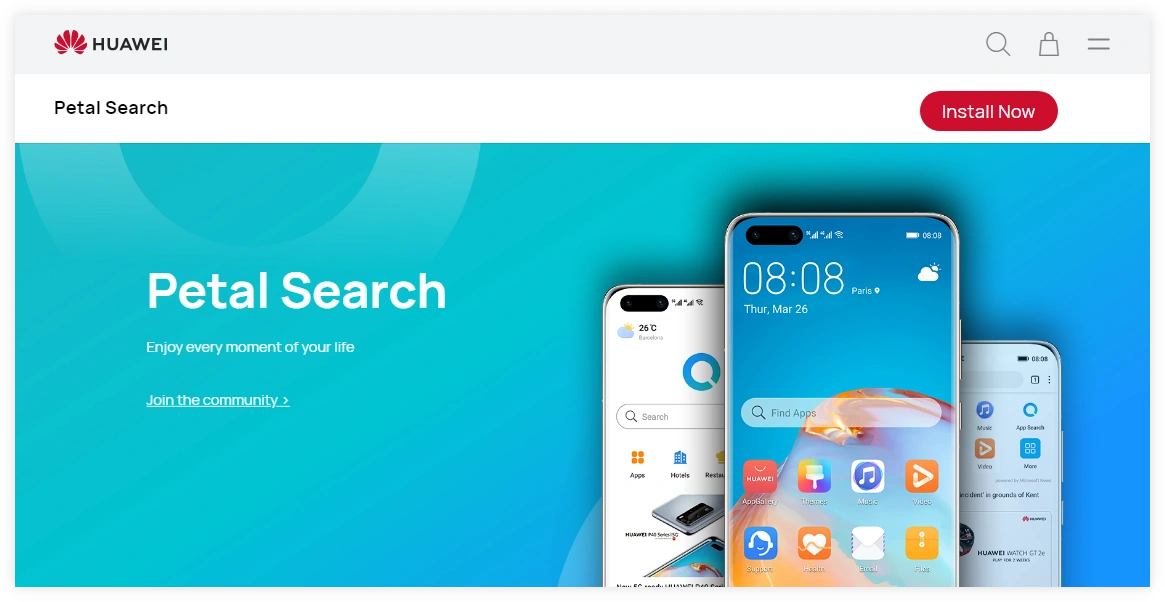
Petal Search is a mobile search app for Android, owned by Huawei, launched in 2020.
It integrates Microsoft Bing to deliver web results and helps users find apps and information based on their interests. The independent web version of Petal Search was unfortunately discontinued in June 2023.
It supports photo searches, reverse image searches, and standard text-based searches, utilizing Huawei’s visual search technology, HiTouch.
This allows for the detection of multiple objects within an image, delivering relevant results based on all detected items.
As of 2021, Petal Search had 18 million active users in the overseas market, with an aim to reach 60 million by the end of that year.
Security and privacy features
Petal Search adheres to strict privacy and copyright standards, certified by the European Privacy Seal for GDPR compliance.
It also offers a private incognito mode to safeguard user privacy.
| Pros | Cons |
|---|---|
| Privacy protection with GDPR compliance | Smaller user base compared to major search engines |
| Comprehensive search results | Discontinued web version in 2023 |
| Supports advanced visual search capabilities |
SEO documentation
Petal Search provides its own documentation for website owners about SEO and its web crawler PetalBot as well as its own Webmaster tool called UniBox OpenWeb.
33. Ask.com
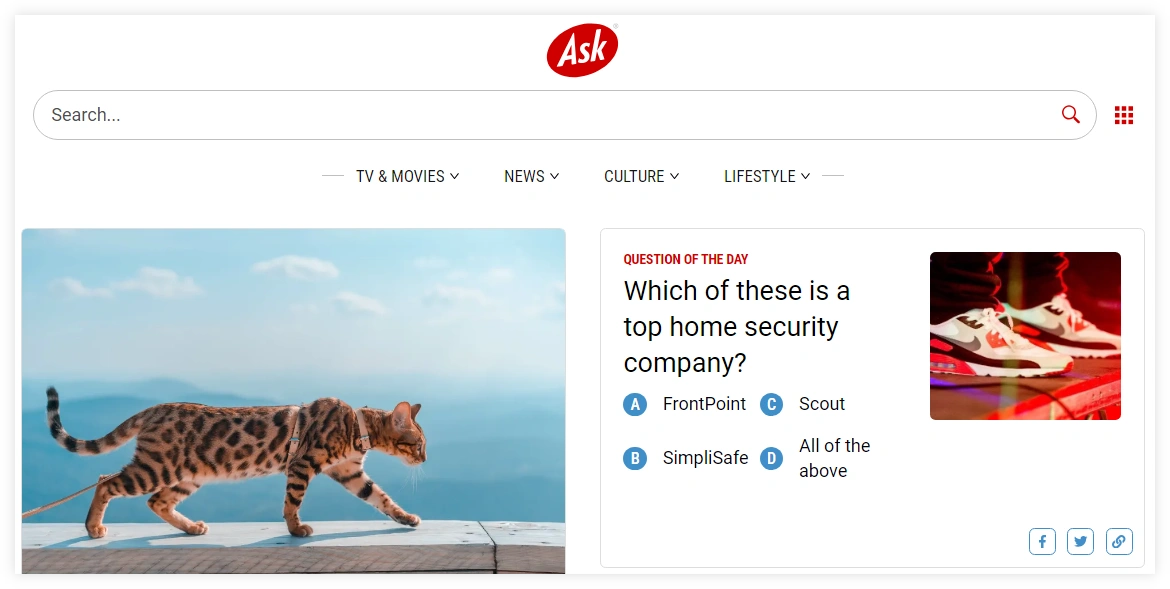
Ask.com, originally known as Ask Jeeves, is a question-answer-focused e-business founded in 1996 by Garrett Gruener and David Warthen in Berkeley, California.
Initially designed by Gary Chevsky, the site refocused on its search engine capabilities in 2006, dropping the “Jeeves” name.
By late 2010, Ask.com outsourced its web search technology, returning to its roots as a question-and-answer site.
Security and privacy features
In 2007, Ask.com introduced “Ask Eraser,” a privacy feature that deletes all user search activity from its servers when enabled.
This includes visited pages, search terms, clicked links, IP addresses, and user/session identifiers.
| Pros | Cons |
|---|---|
| Question-and-answer format | Susceptible to inaccuracies due to human curation |
| Integration with various verticals | Privacy concerns due to data collection for targeted advertising |
SEO documentation
SEO documentation for Ask.com is not available. However, it does produce content related to SEO in its “News” section where you can learn some tips about optimization not only for the Ask.com search engine, but also for the other search engines as well.
34. Gigablast
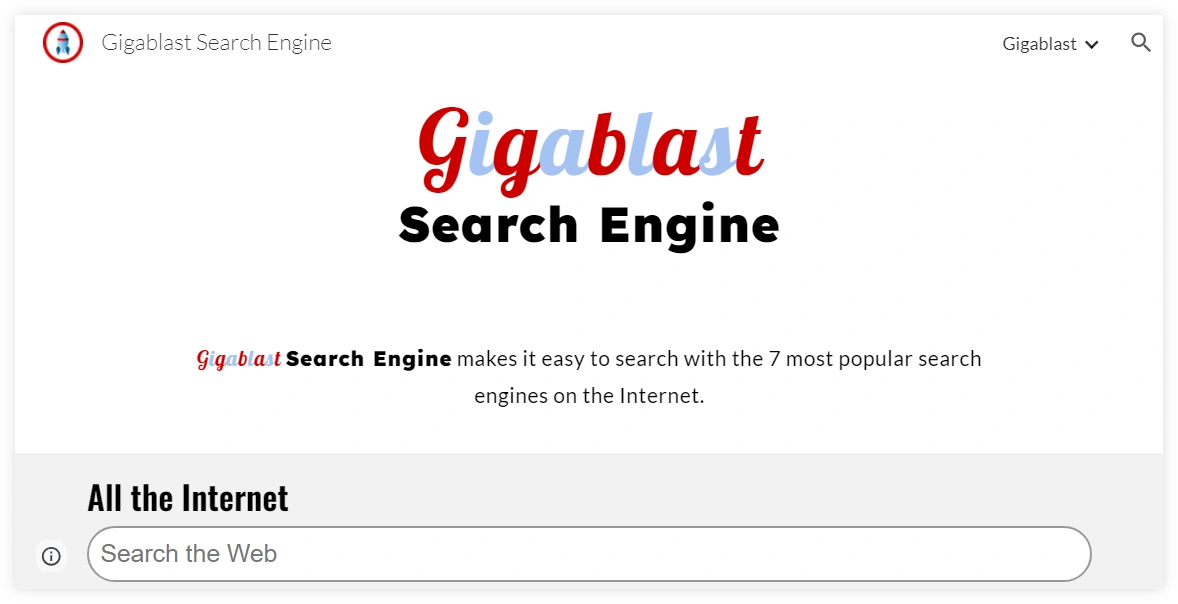
Gigablast was once an American free and open-source web search engine and directory, founded in 2000 by Matt Wells.
It was an independent engine and web crawler that supported specialized searches and Boolean algebra operators.
Features included Giga Bits for related concepts and a blog search feature. Unfortunately, Gigablast went offline in April 2023 without any official statement.
Security and privacy features
Gigablast excelled in user privacy, not sharing user details unlike Google, which uses user information for advertising.
| Pros | Cons |
|---|---|
| Privacy protection | Smaller user base compared to major search engines |
| Comprehensive results | Went offline in April 2023 |
| Support for specialized searches and Boolean operators |
SEO documentation
As Gigablast is no more, there is no SEO documentation.
Frequently asked questions
What was the first search engine?
Archie (from the name “Archives”) was the first search engine created in 1990 by a student Alan Emtage.
Although there were some indexing programs before (like “X.500” or “Whois”), Archie was the first real search engine that was capable of finding specific files on the internet.
Archie worked pretty simply – it looked at the sites available on the internet and indexed them as downloadable files. However, it could not index the content of the sites and therefore the result pages had the form of a simple list.
Why is Google the most popular search engine?
Google, as a search engine, has been a leader in its industry for years and is still dominating the search engine market. There are a few reasons why is Google the most widely used search engine:
- It was one of the first search engines
- It offers relevant and accurate search results
- It is fast
- It is constantly improving
- It provides multiple free services that are compatible (and popular) with Google Search
How do search engines make money?
The main source of revenue for search engines like Google comes from various indirect sources. Search engines can monetize their services via:
- Advertisement – Google uses its own advertisement service called Google Ads thanks to which it can help brands to display their products in the search results and in return takes a small commission every time a user clicks on the ad.
- Online shopping – search engines can promote various products in their enhanced search results. If a user clicks or buys one of the products, the search engine will in exchange take a small percentage from the purchase.
- Services – Google incorporates its services (e.g. Play Store, Google Cloud, Google Apps, etc.) with its own search engine and therefore generates revenue via customers who use them.
What is the difference between a browser and a search engine?
Web browser (e.g. Chrome, Firefox, Microsoft Edge, etc.) is a software application that is installed on the computer or a smartphone. The purpose of the browser is to provide a user-friendly interface to display the webpages.
Search engine (e.g. Google, Bing, Yahoo!, etc.) is an online tool available on the website that can be accessed through a web browser. The purpose of a search engine is to provide answers to users’ queries in the form of relevant webpages.






